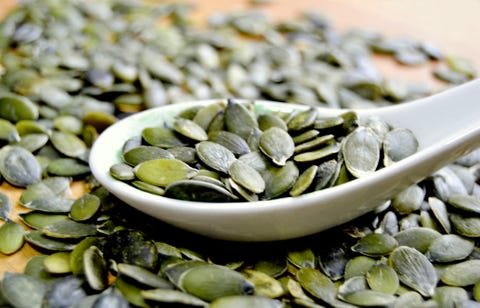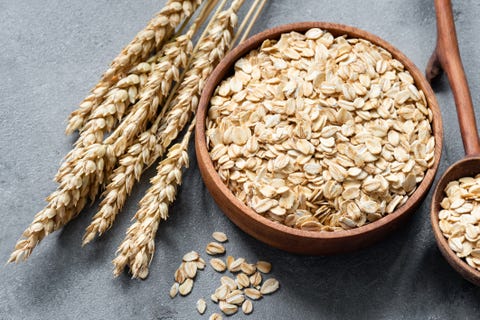What’s not to like about oatmeal? It’s inexpensive, versatile, and endlessly cozy. Not only do oats contain soluble fiber, which has been linked to a lowered risk of heart disease, but half a cup also contains 1.3 milligrams of zinc, which is 16 percent of a woman’s daily need. Consider it yet another reason to love this classic breakfast staple.
Per ½-cup (uncooked) serving: 148 calories, 2.8 g fat (0.4 g saturated), 1.2 mg sodium, 27 g carbs, 0.6 g sugar, 3.8 g fiber, 5.5 g protein
3
Oysters
Per ounce, oysters have the highest zinc concentration of any food. Three ounces of raw oysters contain 32 milligrams of zinc, more than four times the recommended daily intake for the average gal.
Another perk: That same amount of oysters also contains over 100 percent of your daily needs for vitamin B12, which is crucial for your nervous system, metabolism, and healthy blood cells.
Per 3-ounce serving: 50 calories, 1 g fat (0 g saturated), 4.5 g carbs, 0 g sugar, 151 mg sodium, 0 g fiber, 4 g protein
4
Lean Beef
Although experts (like the American Institute for Cancer Research) recommend limiting red meat consumption to no more than a few times a week, lean beef can still be a healthy part of your diet.
Opt for 95 percent lean ground beef or lean cuts (like sirloin) with the fat trimmed, and you'll score 5.7 milligrams of zinc per four-ounce serving. (That's a little over 70 percent of the recommended daily value.)
Per 4-ounce serving: 155 calories, 5.65 g fat (2.5 g saturated), 75 mg sodium, 0 g carbs, 0 g sugar, 0 g fiber, 24 g protein
5
Crab
Love hammering the meat out of whole boiled crabs? Or, do you prefer the ease (and delicious seasoning) of seared crab cakes?
Either way, three ounces of cooked crab meat contains up to 7 milligrams of zinc, about 88 percent of what women need in a day. While the exact amount of zinc you'll get varies from species to species, all crabs are great sources of the mineral.
Per 3-ounce serving of Alaskan King crab: 82 calories, 1 g fat (0 g saturated), 911 mg sodium, 0 g carbs, 0 g sugar, 0 g fiber, 15 g protein
6
Hemp Seeds
Looking for plant-based sources of zinc? Hemp seeds are your best bet. They're loaded with healthy unsaturated fats, and a three-tablespoon serving contains 3 milligrams of zinc, which is 38 percent of the recommended daily amount for women.
Hemp seeds are also high in the amino acid arginine, which research suggests can help reduce your risk of heart disease. Try sprinkling them on your yogurt or salad to mix things up.
Per 3-tablespoon serving: 166 calories, 14.5 g fat (1.5 g saturated), 2 mg sodium, 2.5 g carbs, 0.5 g sugar, 1 g fiber, 9.5 g protein
7Chickpeas
Beans and legumes are another great plant-based option if you want to up your zinc intake without meat. A cup of cooked or canned chickpeas is high in fiber and protein, and contains 2.5 milligrams of zinc (31 percent of women’s recommended daily intake).
Like other legumes, chickpeas offer countless other benefits, too. Get this: Eating chickpeas every day can help you feel more full and satisfied between meals, according to one study. Adding them to a meal can also help keep your blood sugar stable, which means no energy crash later.
Per 1-cup serving: 269 calories, 4 g fat (0.5 g saturated), 68 mg sodium, 45 g carbs, 8 g sugar, 12.5 g fiber, 14.5 g protein
8Black Beans
Another excellent plant-based source of zinc? Black beans. Toss a cup of cooked black beans on top of that salad and you'll get 2 milligrams of zinc, or 25 percent of your daily needs. These beans are also high in iron, phosphorus, calcium, and magnesium, which support overall health and are especially important for bone health.
Per 1-cup serving: 227 calories, 1 g fat (0 g saturated), 2 mg sodium, 41 g carbs, 0.5 g sugar, 15 g fiber, 15 g protein
9Greek Yogurt
Greek yogurt has so many stellar health benefits, and here's yet another one to add to the list: a seven-ounce container of plain, low-fat Greek yogurt packs 1.5 milligrams of zinc, which is 19 percent of what a woman needs daily. It’s also rich in digestion-boosting probiotics.
Per 7-ounce serving: 146 calories, 4 g fat (2.5 g saturated), 68 mg sodium, 8 g carbs, 7 g sugar, 0 g fiber, 20 g protein
10
Cashews
Cashews are one of the most affordable—and, in my totally biased opinion, the most delicious—nuts, so there's no reason not to keep a container in your pantry. Whether you eat them roasted or raw, you'll get just over 1.5 milligrams of zinc per ounce. (That's 20 percent of a woman’s daily needs!)
Cashews are also packed with healthy unsaturated fat. Eating them regularly may help reduce blood pressure and raise healthy HDL cholesterol levels, per one study published in The Journal of Nutrition.
Per 1-ounce serving: 157 calories, 12 g fat (2 g saturated), 8.5 g carbs, 1.5 g sugar, 3 mg sodium, 1 g fiber, 5 g protein


No comments:
Post a Comment